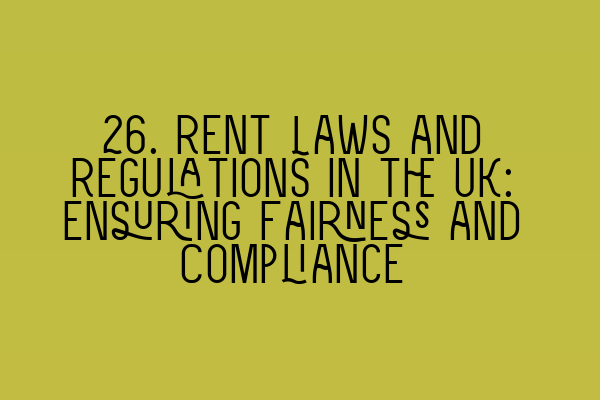26. Rent Laws and Regulations in the UK: Ensuring Fairness and Compliance
Renting a property is a common practice in the United Kingdom, whether it’s for residential or commercial purposes. However, it’s crucial for both landlords and tenants to understand the rent laws and regulations in place to ensure fairness and compliance. In this article, we will explore the key aspects of rent laws in the UK and how they play a fundamental role in maintaining a harmonious landlord-tenant relationship.
Understanding Rent Laws
Rent laws in the UK are governed by various statutes, including the Landlord and Tenant Act 1985, the Housing Act 1988, and the Rent Act 1977. These laws aim to establish the rights and responsibilities of both landlords and tenants, providing a framework that ensures fairness and protects both parties’ interests.
Landlords must adhere to the legal requirements regarding rent collection, rent increases, and tenancy agreements. Tenants, on the other hand, must pay rent on time, maintain the property, and adhere to the terms outlined in the tenancy agreement.
Rent Increase Regulations
When it comes to rent increases, landlords must follow certain guidelines to ensure compliance. Different rules apply depending on the type of tenancy in place.
For assured shorthold tenancies, landlords can only increase the rent with the agreement of the tenant or by providing proper notice. The notice period must be at least six months in advance, and landlords cannot increase the rent more than once in a 12-month period.
For regulated tenancies, rent increases are subject to strict regulations. Landlords must follow the guidelines set out by the Rent Officer, and the tenant has the right to refer any proposed rent increase to the Rent Assessment Committee for review.
It’s important for both landlords and tenants to be aware of these regulations to avoid any misunderstandings or disputes. Seeking legal advice or consulting property lawyers can provide guidance and ensure compliance with rent increase regulations.
Tenancy Deposit Protection
One of the essential aspects of rent laws in the UK is tenancy deposit protection. Landlords are legally required to protect their tenants’ deposits in a government-approved scheme.
There are three main tenancy deposit protection schemes available:
- SQE 1 Practice Exam Questions – SQE 1 Practice Mocks FLK1 FLK2 – SQE 2 Preparation Courses
- SQE 1 Preparation Courses – SRA SQE Exam Dates
- SRA SQE Exam Dates
These schemes ensure that tenants’ deposits are protected and are returned in full at the end of the tenancy, provided the tenant has met their obligations. Failure to comply with tenancy deposit protection laws can result in penalties for landlords, including fines and limitations on possession proceedings.
Termination of Tenancy
The termination of a tenancy is another important aspect of rent laws in the UK. Both landlords and tenants need to understand the required notice periods and procedures for termination.
For assured shorthold tenancies, landlords must provide a minimum notice period of two months when seeking possession of the property. The notice must be in writing and specify the date on which the tenancy will end.
Tenants, too, are required to provide notice should they wish to terminate the tenancy. The notice period is usually one month, but this may vary depending on the terms of the tenancy agreement.
Seeking Legal Advice
Given the complexity of rent laws and regulations in the UK, seeking legal advice is highly recommended for both landlords and tenants. Property lawyers with expertise in rent laws can provide valuable guidance and ensure compliance with legal requirements.
If you’re a landlord or tenant seeking legal assistance, SQE Property Law & Land Law can provide professional advice tailored to your specific situation. Our team of experienced solicitors understands the intricacies of rent laws and can help you navigate the legal landscape with ease.
For more information on rent laws and related topics, take a look at our SRA SQE Exam Dates or our comprehensive SQE 2 Preparation Courses and SQE 1 Preparation Courses.
Remember, understanding rent laws and regulations is crucial for both landlords and tenants to ensure a fair and compliant rental process. By staying informed and seeking legal advice when needed, you can protect your rights and maintain a positive landlord-tenant relationship.
